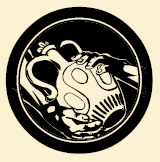I’d been feeling like playing The Clay That Woke for a while, so I took it to Spelens Hus. It’s also Nate’s fault. I hadn’t planned to attend that week, but as it happened, several people showed up hoping I’d be there, so I got a message. I answered back with “traditional or weird?” and Nate said “weird,” so this is what I grabbed. Note, however, that this detail runs counter to my whole point in the video, that this game is not weird in terms of basic ideas and access.
We played in a noisy-ish area so I didn’t record, but I wish I had, at least for showcasing how easy it was for people to learn the Krater draw mechanics. Most of what I have to say is on the video but I remembered one thing while editing. It has to do with screwing up teaching games, even if it’s just a little.
In this case, Mike was playing his character, an Advocate minotaur, whose social role is to advise and caution other minotaurs about Silence. And I was playing a minotaur who was obviously about to break it, and probably justifiably considering that the people currently speaking were suggesting and soon organizing something really stupid. Mike spoke up and advised the other minotaur to speak up – and I made the mistake of jumping in and telling him that this wasn’t what philosophers are about … and then, realized I was wrong. Mechanically, it would mean that Mike would lose a Silence token, and that’s all. And he had three. In other words, it was totally in character and totally “okay by the rules” but him to do that. But I was all motivated to explain the character classes as their relevant rules came up, and butted in when I shouldn’t.
Oh – here’s something else. The game so demands personal symbolic interpretation that I think the discourse (at least that I’ve observed, but that’s a lot) has gone very wrong into constant claims and wrangling about what it all means. I decided a while ago simply to let that lie where it sleeps. Let’s not go there in this discussion either – if you think the game “means” something, go right ahead, but I think it’s better to play it and then talk about what you and the other people’s own particular play-experience means.

